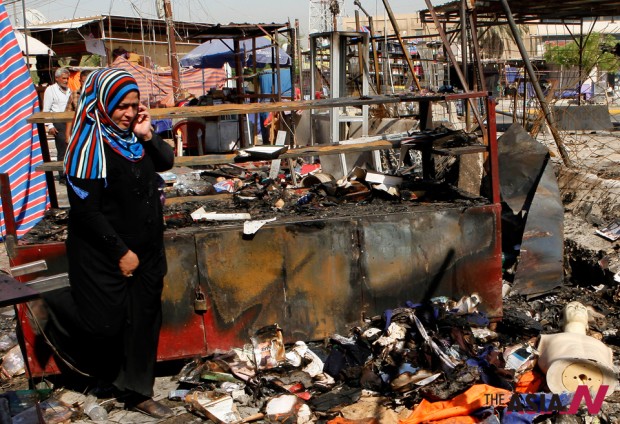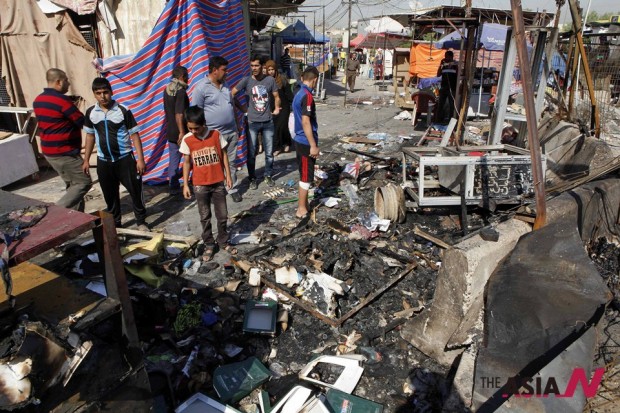Car bombings attacks in Baghdad kill 60 people celebrating end of Ramadan

A woman inspect the aftermath of a car bomb attack on a store in the New Baghdad neighborhood of Baghdad, Iraq, Sunday, Aug. 11, 2013. (Photo : AP Photo/Hadi Mizban)
More than 60 people were killed and over 200 others wounded in a wave of bombings attacks across Iraq on Saturday, mostly in the capital Baghdad, according to latest data given by officials and local media. A total of 12 car bombs went off in Baghdad, mostly targeting markets, restaurants and cafes, killing more than 30 people and injured over 100 others as Iraqis were celebrating the end of the Muslim fasting month of Ramadan.
Five people were killed and 18 others injured when two car bombs exploded in Shaab area in northeastern Baghdad, a police source told Xinhua on condition of anonymity. Meanwhile, four were killed and 14 others wounded when a car bomb blew up in Kadimiya district in northern Baghdad, the source said.
Also, a car bomb exploded in Sadiya district in southwestern Baghdad, killing three and injuring 16 others, while another blast in Abu Dshir district in the southern part of the city killed two and wounded 11.
Furthermore, one was killed and 12 others were wounded when a car bomb ripped through New Baghdad area in the southern part of the capital, the source said, adding that another car bomb attack in Al Amil area injured a total of 14.
A car bomb also went off in Zafraniya district in southern Baghdad, killing one and injuring nine others, while two more car bombs in the southern part of the city killed one and wounded six others, he said. In the northern city of Tuz Khurmatu, some 200 km north of Baghdad, a suicide attack near a Shiite mosque killed 11 people and wounded 60 others, a local police source told Xinhua. Another car bomb went off near a Shiite mosque in Kirkuk, 250 km north of Baghdad, killing one and wounding four others, the source said.
Two car bombs struck the central and northern parts of Nasiriyah, some 350 km south of Baghdad, killing four people and injuring 67 others. Also on Saturday, five people were killed and 11 others wounded in a car bomb attack near a popular market in the holy city of Karbala, some 100 km southwest of Baghdad.
In the town of Al Musab, 50 km south of Baghdad, two people were killed and eight others wounded in attacks by light weapons, a local police source said.

People inspect the aftermath of a car bomb attack on a store in the New Baghdad neighborhood of Baghdad, Iraq, Sunday, Aug. 11, 2013. (Photo : AP Photo/Hadi Mizban)
Overall, some 16 car bombings and other attacks killed more than 60 people and wounded over 200 across Iraq on Saturday, according to latest data. The attacks made one of the country’s deadliest Ramadan months in recent years, as the country is witnessing its worst eruption of violence in five years.
In July, more than 1,000 Iraqis were killed and more than 2,300 were wounded in acts of terrorism and violence, the deadliest month in more than five years, according to UN data. The dire situation raises fears that the country is sliding back to the full-blown civil conflict that peaked in 2006 and 2007, when monthly death toll sometimes exceeded 3,000.
The U.S. government blamed al-Qaida for Saturday’s attacks in Iraq, calling the attackers “enemies of Islam.”
Describing them as “cowardly attacks” that bear the hallmarks of similar suicide and vehicle bomb attacks in Iraq over the past 90 days, State Department spokeswoman Jen Psaki said most of these attacks “have been perpetrated by al-Qaida in Iraq (AQI),” which is led by Abu Bakr al-Baghdadi, also known as Abu D’ua.
“These attacks were aimed at families celebrating the Eid al-Fitr holiday that marks the end of the Muslim holy month of Ramadan. The terrorists who committed these acts are enemies of Islam and a shared enemy of the United States, Iraq, and the international community,” Psaki said.
The U.S. has offered a 10-million-dollars reward for information that helps authorities kill or capture Abu Bakr al-Baghdadi, who is now based in Syria and has changed the name of AQI to the Islamic State of Iraq and Sham. This reward is second only to information leading to the capture of Ayman al-Zawahiri, the head of al-Qaida, Psaki said.
The United States is prepared to work closely with the Iraqi government “to confront the threat posed by Al Qaida in Iraq and other terrorist groups,” she said. The U.S. and Iraq will hold discussions on strengthening bilateral cooperation on fighting terrorism and other areas during next week’s visit to Washington by Iraqi Foreign Minister Hoshyar Zebari, she added.
Washington’s response came after it temporarily closed embassies and missions across the Islamic world last week on alert of increased threat of potential terror attacks. Saturday’s attacks also followed major crackdowns on terrorists and militants in Iraq, which are among the biggest security operations since the pullout of U.S. troops in December 2011. <Xinhua/NEWSis>




























































